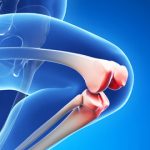In a recent study, tanezumab proved safe and effective in the treatment of knee and hip osteoarthritis…


In a recent study, tanezumab proved safe and effective in the treatment of knee and hip osteoarthritis…

At the time of total joint arthroplasty, RA disease activity has been shown to better predict postoperative flare than medication management…

SM04690, an intra-articular injection for knee OA, will soon enter phase 3 trials to assess its effects on pain, joint function and disease…
Megan Brooks |
NEW YORK (Reuters Health)—Total knee replacement (TKA) is increasingly being performed in younger patients, and new research suggests that these patients have a higher risk for complications than older patients. “The number of knee replacements we are doing in younger and younger patients keeps increasing every year and we need to let these patients know…
Carolyn Crist |
(Reuters Health)—Patients with knee osteoarthritis (OA) can add hip-strengthening exercises to their workout to improve the ability to walk and maybe reduce pain, according to a research review. Based on pooled data from eight clinical trials with a total of 340 patients, hip strengthening exercises involving weights or elastic bands would help the most, the…
Obesity is a well-known risk factor for knee osteoarthritis (OA), but data regarding the association of body composition (fat and muscle mass) with the risk of knee OA are lacking. Thus, it is not clear whether the effects of BMI, typically interpreted as effects of obesity, are truly due to excess adiposity rather than to overall loading due to the combined weight of body mass. Misra et al. undertook this study to examine the longitudinal association of body composition categories based on fat and muscle mass with the risk of incident knee OA…

In a recent Phase 2 clinical trial, patient-perceived pain and function measures improved with SM04690, an injectable, disease-modifying osteoarthritis treatment currently in development…
Arthritis Care & Research |
Obesity is a modifiable risk factor for many patients with knee osteoarthritis (OA), and the National Institutes of Health recommend an initial weight loss goal of 10%. But how does losing more weight affect knee OA patients? In a new study, researchers compared the outcomes of knee OA patients who lost more and less than the recommended 10% of their baseline weight, finding significant improvement in health-related quality of life and reduction in pain for patients who lost twice what’s recommended…

New research shows tanezumab may be safe and effective for patients with osteoarthritis pain…
Lisa Rapaport |
(Reuters Health)—Obese people with knee osteoarthritis (OA) may find greater symptom relief when they lose larger amounts of weight, a recent study suggests. Researchers examined data on 240 obese adults with pain from knee OA who were participating in an 18-month experiment to see how diet alone or diet plus exercise affected their health. Participants…